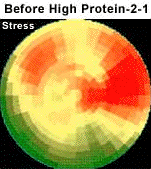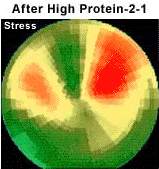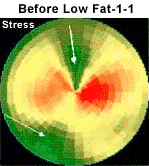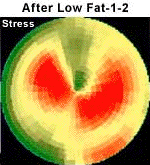|
|
Nutrition |
|
|
Even with this knowledge, many people worry that removing meat from the diet isn't healthy. You've probably heard the argument that meat provides necessary protein that is extremely hard to get from only eating plants. One survey respondant said, "There are certain proteins that you need to get from other mammals." This protein is sometimes (misleadingly) called "high quality" or "complete" protein. Although that's what cattle butchers would like you to believe, research shows that "it's easy... to meet the recommendations for protein [both in amount and in type]" (VRG.org) by simply eating combinations of foods. For instance, beans and rice together provide as many necessary kinds of protein as do any meat (and far less artery-blocking fat). So what about the new high-protein diet fad that's been getting some rave reviews? About half of those surveyed thought the diet "works" or "probably works." But think again about who wants you to eat like that: the meat industry! In truth, the "American Dietetic Association recently condemned high-protein diets as being dangerous, 'a nightmare of a diet'" (Ornish). While it's true that many people have lost weight on it, "keeping it off is a lot harder. A few years ago, the government… found that two-thirds of people gained back all of the weight they lost within a year, and 97% gained it all back within five years." Vegetarianism, on the other hand, is neither ineffective nor a "fad diet." In contrast with the above findings, Dr. Ornish "found… that the average person [going to a vegetarian diet] lost 24 pounds in the first year and kept off more than half that weight five years later." And vegetarians have been in existence since the first records of history; Plato, Socrates, Newton, da Vinci, Edison, and Einstein are just a few examples of the famous ones (there's a huge list in Gabbe 28). Despite the fact that vegetarians have been shown to be healthy and numerous, some continue to argue that vegetarians have trouble getting enough calcium, vitamin B-12, iron, etc. Just like "the protein argument," that is a myth. Of course the dairy industry would like you to think that you need milk to grow strong, healthy bones, but plenty of calcium is found in broccoli, spinach, kale, figs, and almonds, to name a few (Gabbe 63). In fact, animal protein is known to actually decrease the amount of calcium available to your bones! Since protein is somewhat acidic, your body has to release calcium to equalize the pH in the blood stream. Where does this calcium come from? Your bones, of course -- the only place calcium is stored. This is why eating meat, an excessive source of protein, can lead to osteoporosis. Similarly, the meat industry would like you to think that vegetarians easily become anemic, but in reality foods such as dried fruit, lentils, tofu, broccoli, beets, squash, even sesame seeds provide lots of iron (Gabbe 56-7). In fact, studies have shown that "vegetarians actually get more iron than meat eaters do" (Gabbe 52). Think about it: where do cows and other animals get their calcium and iron? From plants they eat, of course. Is it all that surprising that humans can skip the "middleman" and get all the necessary nutrients by eating plants themselves? |
||
|
|
Poisons -->
Introduction
| Studies
| Fat
| Nutrition | Poisons
| Conclusion
| Bibliography
![]()




